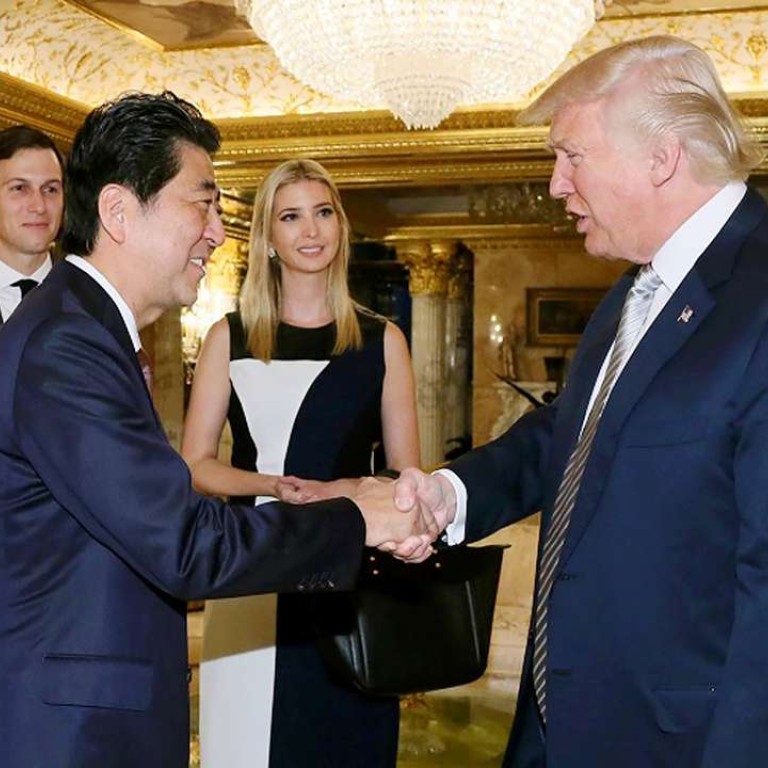
Trump seeks speedy progress with Abe over TPP replacement
One-on-one talks with the US on a trade deal are “not absolutely impossible”, Abe told lawmakers on Thursday in Tokyo, adding that he’s finalising negotiations for a summit with Trump. The leaders are set to have a phone conversation in the coming days before meeting in Washington on February 10, the Yomiuri newspaper reported.
An official in the Trump administration said Trump will seek quick progress towards a bilateral trade agreement with Tokyo to replace the deal when Abe visits.
“I see Abe’s visit being more about finding a follow-through, a replacement for TPP,” said the official, referring to the Trans-Pacific Partnership. “Given the domestic political capital [Abe has] expended on TPP, there’s going to be an effort to work with him on a follow-on,” the official said, speaking on condition of anonymity.
The White House declined comment on the official’s remarks. “We look forward to Prime Minister Abe’s upcoming visit and a productive relationship with Japan,” a White House official said.
Watch: Abe has ‘great confidence’ in Trump
Abe, a key proponent of the TPP regional trade agreement, is seeking ways to boost economic relations with Japan’s only military ally.
Trump prefers to negotiate bilateral trade deals and has warned that he might withdraw US troops from South Korea and Japan if allies did not pay more for their services.
“We will appeal [to the US administration] on the TPP, but that doesn’t mean we absolutely can’t also [sign] an EPA or FTA, as we did with [fellow TPP signatory] Australia,” Abe said.
The remaining 11 TPP nations - Japan, Australia, New Zealand, Canada, Brunei, Chile, Malaysia, Mexico, Peru, Singapore and Vietnam - are expected to hold talks in March to try and salvage the multilateral trade pact.
Australia has suggested China as a possible TPP member, replacing the United States, but Beijing has its own multilateral trade pact and Japan is cool on the idea. Many Asian nations had seen the TPP as a counterbalance to China’s growing power in the region.

Asked in parliament about the potential fate of Japan’s sensitive agricultural sector in any bilateral talks, Abe vowed to “protect what must be protected”.
Abe said he wanted the Washington summit to show that the alliance between the two nations is “unshakable”, adding that he planned to discuss the East China Sea and the South China Sea. Japan relies on the US for a “nuclear umbrella” to protect against regional threats including North Korea and China.
Abe indicated Deputy Prime Minister Taro Aso, who is also finance minister, will go with him to Washington and meet US Vice President Mike Pence.
“[During the Obama presidency] we had a thick pipeline between [former vice-president Joe] Biden and Aso, and I want there to be opportunities for contact with Mr Pence, including when I visit the United States,” Abe said.

Asked by his former Defence Minister Itsunori Onodera to comment on bolstering Japan’s own defences to enable pre-emptive strikes on missile bases, Abe said this was legally possible, but there was no plan to gain such capabilities.
“I want to strengthen the deterrent power of the entire US-Japan alliance,” Abe said. “We must think about our own deterrence in the context of our defence-only policy and within the framework of the alliance.”
Chief Cabinet Secretary Yoshihide Suga indicated Defence Minister Tomomi Inada will explain to Mattis that Japan is already appropriately shouldering its share of the burden for the Japan-US alliance if the issue comes up in their talks in Japan.
Kyodo, Bloomberg, Reuters

